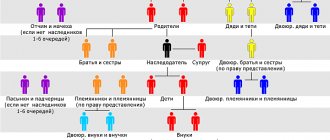5
When inheriting the property of a deceased person, disputes often arise. The testator's relatives are often dissatisfied with the size of the share assigned to him, challenge the will or try to restore the deadlines for taking over the rights. More and more legal disputes are associated with the recognition of heirs as unworthy. Of course, just a statement is not enough - you need evidence, and strong evidence at that!
Is it possible and how to recognize an heir as unworthy? The process is not easy, so we will look at all the reasons and nuances so that you have an idea of the progress of the case. Well, if you have any questions, you can ask our lawyers.
Who is the unworthy heir?
Many people have probably heard the concept of “unworthy heir.” However, few people know what it means and who it applies to? The legislator devotes an entire article to the term - 1117 of the Civil Code of the Russian Federation, which answers many questions.
An unworthy heir is a citizen who has committed illegal actions against the testator. The goal could be to increase one's own share of the inheritance. Moreover, illegal actions can be committed not only by the main contender, but also by third parties at his request.
Suppose the heir was found unworthy. What consequences does this status entail? Heirs who are found unworthy lose the right to the property of the deceased . It happens that the applicant is deprived of the right, being in the first category of relationship. There are cases where children, parents and spouses were recognized as unworthy heirs.
The fact of unworthiness is confirmed exclusively through the court. Suspicions of relatives or assumptions of heirs do not deprive the applicant of his legal rights. For example, if the heir did not participate in paying utility bills, but later claimed rights to the inheritance, he will most likely receive the inheritance. There can be no talk of any “unworthy” status.
Unworthy heirs: categories
Citizens who illegally try to inherit an inheritance
There is a category of citizens who try to enter into an inheritance illegally, knowing that they do not have the right to inheritance.
The legislator has taken all measures to prevent such arbitrariness. The actions of such persons can be declared invalid and they can be recognized as unworthy heirs.
Thus, unworthy heirs are persons who, through their intentional illegal actions aimed at:
- against the testator, any of his heirs or against the implementation of the last will of the testator expressed in the will;
- contributed or attempted to promote the calling of themselves or others to inheritance;
- contributed or attempted to promote an increase in the share of the inheritance due to them or other persons.
These circumstances must have judicial confirmation, in particular:
- criminal court verdict;
- court decision in civil disputes.
For example, a decision to invalidate a will made under the influence of violence or threat (paragraph 1, paragraph 1, article 1117 of the Civil Code of the Russian Federation, paragraph “a”, paragraph 19 of the Resolution of the Plenum of the Supreme Court of the Russian Federation of May 29, 2012 No. 9 “On Judicial Practice in inheritance cases").
Persons who, for one reason or another, are considered unworthy heirs, can still enter into inheritance rights if the testator, after they lost the right to inherit, bequeathed their property to them (paragraph 1, clause 1, article 1117 of the Civil Code of the Russian Federation).
Parents who have been deprived of parental rights
Parents do not inherit by law after children in respect of whom the parents were deprived of parental rights in court and were not restored to these rights by the day the inheritance was opened (paragraph 2, paragraph 1, article 1117 of the Civil Code of the Russian Federation).
This measure is aimed at protecting the rights and legitimate interests of children.
Citizens who maliciously evade the obligation to support the testator
The testator has the right, through a judicial procedure, to remove from inheritance by law an heir or a person who maliciously evades the fulfillment of their obligations to support the testator (Clause 2 of Article 1117 of the Civil Code of the Russian Federation).
This measure is based on the principle of fairness, which is a fundamental principle in jurisprudence and law in general.
Grounds for recognizing an heir as dishonest and unworthy
To initiate a court hearing, compelling reasons are required - we remind you that they are listed in Art. 1117 of the Civil Code of the Russian Federation.
Let's look at them in order:
- Unlawful actions towards a deceased citizen
This includes persons who committed unlawful acts against a deceased citizen. For example, forgery/destruction of a will, forcing the testator to draw up a document in his name, or murder (due to jealousy).
The main goal is to increase the share of the inheritance. The heirs themselves could make attempts to instill their desires in the testator or persuade other applicants. However, regardless of what actions the unworthy heirs committed, these facts must be proven in court. Mere assumptions from the relatives of the deceased person are not enough.
Read, is it possible and how to invalidate a will?
- Evasion of obligations to support the testator
It is important to note that the obligation to support the deceased arises for a reason. There must be a logical explanation for this, namely a court decision. A striking example is the obligation to pay alimony for a child or disabled persons (Article 80 and Article 88 of the RF IC). For example, the father did not pay child support, as a result of which the child did not receive the necessary help. Debt for alimony is direct evidence not in favor of the unfortunate alimony payer.
- Deprivation of parental rights
It occurs quite often, not only in relation to fathers, but also mothers. However, if the reasons that formed the basis of the court decision no longer exist, such persons may apply to the court with a request to restore parental rights. If the court grants the request of the mother or father, their rights are subject to restoration. Further inheritance of parents/children's assets will occur in accordance with the general procedure.
Why is it necessary to recognize heirs as unworthy?
The first category of persons who may be deprived of inherited property includes citizens who tried to obtain it illegally. We are talking about fraud, psychological pressure and physical harm.
For example, a testator forges a will or it turns out that it was written by the testator under moral pressure, threats or blackmail.
Also, unscrupulous citizens can cause intentional harm to the health of the testator in order to quickly receive his property.
There are known cases when illegal actions are committed in relation to other heirs in order to obtain their share of the property, or the elimination of those persons who, by law, are the primary heirs occurs.
In addition to the fact that such actions are punishable by law, the offender is deprived of rights to inheritance.
There is no strict list of crimes that lead to deprivation of the right to property, so each case must be considered separately. Obviously, any crime proven and convicted in court will make it impossible for the applicant to receive the property of the testator.
The situation with citizens deprived of parental rights is the most understandable and transparent. The grounds for deprivation of rights must be compelling, and if the court made such a decision, it means that the parents did not fulfill their duties towards the child: they evaded maintenance or caused physical harm.
Whatever the reasons, parents cannot rely on the property of someone they did not care about.
The same applies to the third category. Citizens who have renounced their material obligations to relatives cannot claim their property.
Even those who are legally required heirs can be recognized as unworthy heirs. This rule helps protect testators.
Common Misconceptions
The lack of legal education often leads to various kinds of misconceptions related to the lifestyle of the heirs. Below are some of them:
| Type of delusion | Position of the law |
| The heir leads an immoral lifestyle (refuses to work, abuses alcohol, is rude to the testator and heirs) | The personal qualities of a citizen, his lifestyle cannot be a reason for declaring the heir unworthy |
| The applicant is in conflict with the testator and makes indecent remarks about him | If conflicts on domestic grounds do not develop into a crime, they do not deprive the applicant of property rights |
| The heir does not maintain a relationship with the testator, is not interested in his life or circumstances | Lack of direct contact with a person does not exclude the possibility of inheriting his property |
| The applicant did not provide assistance to the testator, did not pay utilities, and refused to make cosmetic or major repairs to the apartment | If the provision of assistance is not obligatory (for example, payment of alimony), then such actions cannot be grounds for exclusion from inheritance |
| The heir did not appear at the funeral of a close relative | The moral side of the issue has nothing to do with inheritance |
| Recognition of the applicant as unworthy during the life of the testator | Removal of applicants from inheritance occurs only after the death of an individual |
How to prove that the heir is unworthy?
Such facts are established in court - the notary is not authorized to recognize the heir as unworthy. Interested parties need to prepare a corresponding application. Written evidence of the stated requirements will also be required. Failure to provide proper documents will result in the claim being denied.
Please note that the claim is filed only after the death of the testator. The plaintiff may be a group of heirs or individual representatives (dependents). For example, if their rights to receive a mandatory share in the property of the deceased are infringed.
Procedure and procedure
The plaintiff needs:
- Preparing documents is the main focus on the evidence base.
- Draw up and file a claim in court.
- Wait until the court hearing begins.
- Provide all available evidence - they will be discussed below.
- Justify your claims in court.
- Wait for a court decision.
Expert opinion
Stanislav Evseev
Lawyer. Experience 12 years. Specialization: civil, family, inheritance law.
If the court satisfies the requirements, the plaintiff heir turns to the notary who opened the inheritance case. The court decision serves as the basis for canceling a previously issued certificate of inheritance. The notary also revokes the documents of the remaining heirs - the inheritance rights are re-registered. The property is divided among bona fide claimants, and the withdrawing participant does not participate in the division of property.
Claim to declare an heir unworthy
The form of the statement of claim is noted in Art. 131 Code of Civil Procedure of the Russian Federation.
The document must contain:
- the name of the court in which the claim is filed;
- information about the applicant (full name, actual residential address);
- similar information about the defendant;
- cost of the claim - the entire amount of the claims;
- document's name;
- circumstances of the case (when the testator died, date of opening of the inheritance, number of applicants, grounds for recognition as unworthy);
- final requirements;
- list of attached papers.
The key document when filing a claim is a receipt for payment of the state duty. Its absence will lead to the court leaving the application without progress and giving a deadline to eliminate the shortcomings. If the plaintiff wishes to make motions, they can be filed during the trial.
Below is a sample claim:
It is better to entrust the preparation of such documents to experienced lawyers. This will avoid multiple clarification of claims and take into account the key factors that the court relies on when making a decision.
Required documents
Standard package of documents for a claim:
- The plaintiff’s identity card is a Russian passport;
- death certificate of the testator - issued by the registry office or kept by other heirs (see “How to restore a death certificate?”);
- papers confirming relationship with a deceased citizen - birth certificate, marriage certificate, adoption certificate;
- documents of title to the assets of the testator - for example, an agreement on privatization, sale and purchase, exchange;
- written evidence of the defendant committing unlawful acts (see below).
If the plaintiff wishes to invite witnesses, a separate statement must be prepared. You will also need to scan a package of documents for citizens summoned to court.
Evidence of illegal activities
The basis of any claim is evidence. Therefore, care must be taken to prepare adequate evidence that will allow the court to make a decision.
When filing a claim to declare an applicant unworthy, you can use:
- a court decision on alimony (for example, the father did not pay child support, the mother went to court and received a writ of execution for alimony);
- a certificate from the FSSP about the presence of an outstanding alimony debt or the search for a defaulter (for example, the child’s father did not pay alimony, changed his place of residence, did not work anywhere, tried to go abroad without court permission);
- court verdict against alimony defaulter;
- a court verdict in a case of causing grievous bodily harm or murder of the testator (the commission of a crime is a clear reason to deprive the heir of the rights to the property of the deceased);
- court decision to invalidate the will (for example, the grandmother made the will under threats and blackmail from her grandson).
Witness testimony can also be used. For example, if there are persons who can confirm the fact that the applicant persuaded them to give up their share of the inheritance in order to increase his part of the property.
State duty, expenses
The amount of state duty is determined by the Tax Code. When filing a claim of a non-property nature, you need to pay 300 rubles.
The procedure for declaring an heir unworthy
The recognition of an heir as unworthy and his exclusion from inheritance is carried out on the basis of decisions of a court or a notary. A notary can declare a heir unworthy without a trial if there are grounds confirmed by the court, for example, deprivation of parental rights.
Thus, unworthy heirs are persons who do not have the right to claim an inheritance for one reason or another, but the grounds for such a decision must be legally confirmed.
To deprive a person of the right to the property of the testator, you need to know how to recognize the heir as unworthy by law. This verdict can be made both in relation to the heir by law and in relation to the one who inherits by will.
There is only one exception in which a citizen declared unworthy can receive property - a situation in which the will was drawn up after the court made a decision on unworthiness.
However, such a procedure is not very common in judicial practice. More often, there is a recognition of unworthiness based on the claim of relatives for “malicious evasion of maintenance obligations” after the death of the testator.
It is important to understand that this definition mostly means:
- refusal of financial support (evasion of alimony obligations);
- hiding your income;
- any other actions aimed at eliminating financial liability.
For example, a father who did not pay child support or hid the amount of his salary will be considered unworthy and will not be able to claim the child’s property.
It is difficult for a person who does not understand this issue to determine who is among the unworthy heirs, so it is recommended to contact a notary who:
- determine whether the procedure is possible in a particular case;
- will tell you how to disinherit an unworthy heir;
- will help with paperwork.
Any person interested in a share of the inheritance can initiate the procedure. To do this, you need to draw up a statement of claim and submit it to the court, attaching a package of documents.
How to file a claim
The statement of claim must contain the following main points:
- Full name and contact information of the plaintiff and defendant.
- Full cost of the claim.
- Full name and date of death of the testator.
- The line of succession of the plaintiff and the defendant.
- Grounds for inheritance (by will or law).
- Reasons why a defendant may be found unworthy.
- Names and addresses of witnesses.
- List of applications.
Under different circumstances, additional information may be required and must be included in the application. Therefore, it is better to contact experienced lawyers and notaries for competent preparation of claim documents.
Obviously, the court cannot make a decision based on one application. To prove that the heir is unworthy, evidence is needed. It is also necessary to identify witnesses who are ready to confirm the facts stated by the plaintiff regarding the behavior of the defendant.
Consequences of declaring an applicant unworthy
If, following a court hearing, the court satisfies the claims, the heir will become unworthy and lose the right to the property of the deceased. The returned property is distributed among the remaining heirs.
What to do if a person has already entered into rights? The property he received must be returned . If the heir cannot return it in full, he will have to compensate the other heirs for the value of the assets.
The price of the inheritance is determined on the date of its acceptance - the cadastral, market or inventory value is taken as the basis. Notaries and courts request an up-to-date assessment, i.e. archived data will not work. Read more about this in the article “Valuation of property upon entry into inheritance.”
Can the descendants of an heir who has lost the right of inheritance inherit assets by way of representation? No, because the legislator deprived them of such an opportunity (clause 2 of Article 1146 of the Civil Code of the Russian Federation).
Example. The plaintiff filed an application to declare the heir unworthy. At the same time, a claim was made for the recovery of unjust enrichment. The essence of the dispute is that after the death of the grandparents, an inheritance was opened, which was accepted by the plaintiff’s father. Soon the man moved into the house with his family, including the plaintiff. Later, the marriage broke up: the plaintiff left home with his mother, and some time later his father died. On the day of his death, the plaintiff was a minor - therefore, he could not inherit on his own. The testator's half-sister took advantage of this. She filed a claim to extend the deadline for taking over her grandparents' property. The woman indicated in the statement that there are no other heirs besides her. She also hid the fact that her brother actually accepted his parents' inheritance. The plaintiff considers the actions of the heir illegal and such that they led to the illegal enrichment of the defendant. The court partially satisfied the claims and recovered from the defendant an amount commensurate with the share of the inheritance that was due to the plaintiff (Decision of the Dorogobuzh District Court of the Smolensk Region dated October 18, 2017, case No. 2-294/2017).
Recognition of an heir as unworthy through court
In order for you to be able to recognize your relative as an unworthy heir , you need to go to court , since no other methods are provided. To do this, you will need to leave a corresponding statement in which you describe all the circumstances. For example,
- the heir committed a number of actions that led to the fact that he received all the inherited property.
- Namely, he did not inform the notary that you are also an heir and you are entitled to ½ share in the inheritance.
- At the same time, he told you that he would not formalize the inheritance, but he did the opposite.
- It is also possible that through the actions of such an heir, the death of the testator occurred through the fault of the heir, who caused serious harm to his health.
- Or he brought to the notary a forged refusal of inheritance , which you allegedly drew up.
- You must indicate these circumstances in your application.
The evidence will be a verdict against such an heir, by whom he was brought to criminal liability, a court decision on deprivation of parental rights, on the collection of alimony for the maintenance of children or parents. These documents are attached to the claim and submitted to the court.
The procedure for distributing the assets of an unworthy heir
The property that was awarded to the unworthy applicant is divided equally among the other applicants. Consequently, the share of property of each heir increases in proportion to the added share. As we found out above, the basis is a court decision.
The document must be presented to a notary. Moreover, it is not necessary for a court decision to declare the applicant unworthy. A decision made on the basis of the first two paragraphs of Art. is sufficient. 1117 of the Civil Code of the Russian Federation: crime against the testator or non-payment of alimony and deprivation of parental rights.
Commentary to Art. 1117 Civil Code of the Russian Federation
1. The commented article establishes two types of unworthy heirs.
The first - conditionally they can be called “absolutely unworthy” (clause 1 of Article 1117 of the Civil Code of the Russian Federation) - do not inherit due to the fact that there is a court decision that confirms the relevant circumstances, and the second (clause 2 of Article 1117 of the Civil Code of the Russian Federation) - “conditionally unworthy” - are excluded from inheritance only at the request of interested parties (other heirs).
This distinction seems important, since “absolutely unworthy heirs” cannot participate in the inheritance legal relationship, even if the remaining heirs or creditors agree and desire it. “Relatively unworthy” heirs participate in the inheritance legal relationship if the remaining heirs agree to this and have not actively expressed their disagreement.
2. It seems that it is possible to promote or try to promote a call to inheritance or an increase in the inheritance share of well-known persons only by facilitating the occurrence of the event of opening an inheritance or by taking actions to reduce the number of heirs by will or by law or by completely eliminating them. In connection with the above, as well as taking into account the provisions of Art. 1114 of the Civil Code of the Russian Federation, it seems that the intentional illegal actions referred to in paragraph 1 of the commented article should be understood as crimes or attempted crimes against the life of the testator or heirs (Chapter 16 of the Criminal Code of the Russian Federation). Accordingly, confirmation of these circumstances can only be a court verdict that has entered into legal force.
3. Actions directed against the implementation of the last will of the testator should be understood as actions that resulted in a distortion of the true will of the testator, including due to deception, threat, misrepresentation, as well as forgery of a will. Accordingly, intentional actions aimed against the implementation of the last will of the testator should be understood as crimes or attempted crimes against the health of the testator (Chapter 16 of the Criminal Code of the Russian Federation), committed with a selfish motive, and crimes against property (Chapter 21 of the Criminal Code of the Russian Federation).
Arbitrage practice
Quite often, courts reject the claims of heirs. The main reason is the lack of proper evidence. However, there is also good practice on this issue. Let's consider several situations.
Example. The plaintiff applied to the court with a request to include ½ of the house in the estate. It was also announced that the applicant was recognized as unworthy. The woman alleged that her mother married the defendant. They bought a residential building with common money. The mother later died from the injuries inflicted on her. The culprit of the crime was the defendant, which is confirmed by the verdict of the Sakmarsky District Court. According to the woman, the defendant is an unworthy heir. Consequently, she is the only claimant to her mother's property. The woman submitted her application for acceptance of the inheritance in a timely manner. However, she cannot conduct an inventory of the living quarters because the defendant is serving time in prison. The stated requirements are satisfied in full. (Decision of the Sakmara District Court dated April 10, 2012, case No. 2(2)-180/2012).
The basis of the judicial act was a previously passed sentence in a criminal case. It clearly shows that the inheritance was opened due to the unlawful actions of the defendant. Therefore, the court declared him an unworthy applicant.
Example. The plaintiff asked to recognize the defendant (heir) as unworthy. The man claimed that his brother illegally took possession of the joint housing that belonged to their family. And later, the defendant somehow convinced their mother to make a will for herself. The defendant filed a counterclaim - his claims were similar. The key role was played by the court decision, which declared the order invalid. There was also evidence in the case that one of the applicants abandoned the property in favor of the defendant. These actions led to a decrease in part of the plaintiff’s inheritance. The stated demands were satisfied (Decision of the Caspian City Court dated May 22, 2012).
Restoring the rights of unworthy heirs
What to do if you are recognized as an unworthy heir? Is there really nothing we can do and will we have to accept the situation?
Restoration of lost rights occurs through the courts. For example, if a citizen has been deprived of parental rights, he can restore them when life conditions arise: this includes changing his previous lifestyle or attitude towards the issue of raising children. A parent who has lost parental rights can initiate a court hearing (Article 72 of the RF IC).
For example , the father was deprived of parental rights for drinking alcohol, lack of work, and failure to pay child support. Over time, he came to his senses, got a job as a mechanic at a factory, got rid of bad habits, found money and began to transfer part of the funds to his son. Given the dramatic changes in his life, the father may apply for restoration of parental rights. Consequently, he will be among the child's heirs.
If there is a court decision regarding a deceased parent, his descendants can apply to the court to review the decision. However, they will need to provide convincing evidence of his innocence: medical reports, SSP certificates about debt repayment, a job description, a 2-NDFL certificate of income, an extract from the Unified State Register of Property Rights, an application from the second spouse, etc.






